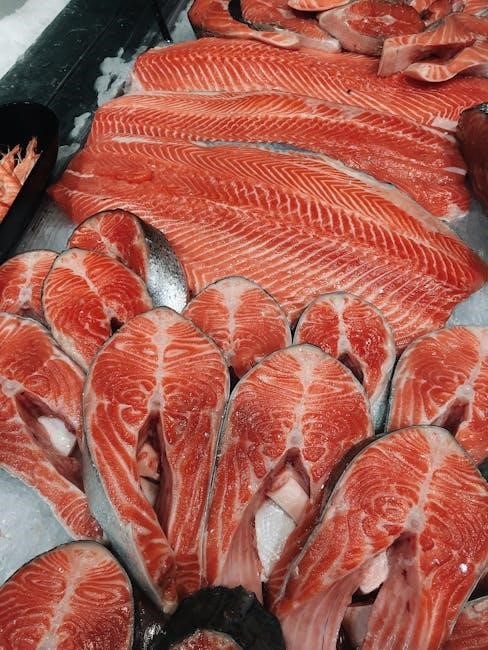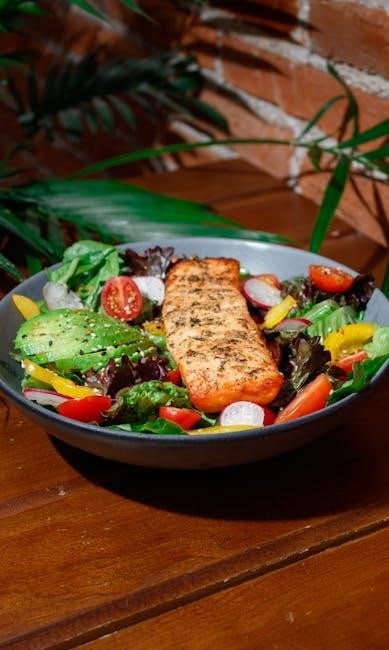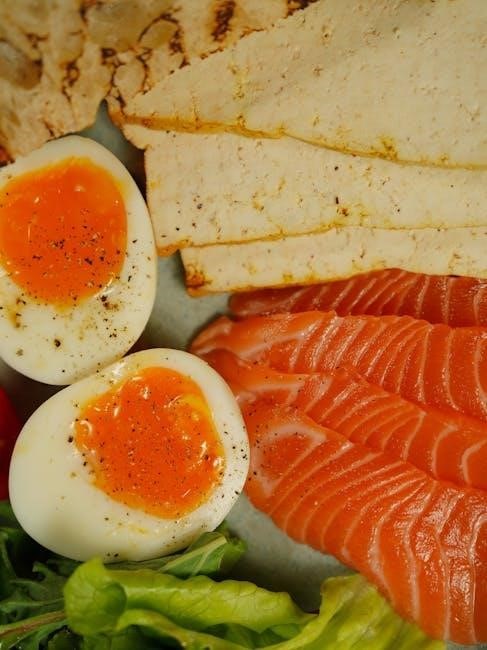
pescatarian diet plan pdf
The pescatarian diet is a flexible and balanced lifestyle choice, combining vegetarian principles with the inclusion of fish and seafood for added protein and omega-3 benefits.
What is a Pescatarian Diet?
A pescatarian diet is a flexible eating pattern that combines elements of vegetarianism with the inclusion of fish and seafood. It excludes all forms of meat but allows fish and seafood as primary protein sources. This diet is often chosen for its health benefits, as it incorporates heart-healthy omega-3 fatty acids found in fish like salmon and mackerel. It also emphasizes plant-based foods, such as fruits, vegetables, whole grains, and legumes, making it a balanced and nutrient-rich choice. The pescatarian diet is ideal for those who want to reduce their meat consumption but still enjoy the nutritional advantages of seafood.
It is a versatile option that can be tailored to suit various lifestyles and dietary preferences.

Key Components of a Pescatarian Diet Plan
A well-structured pescatarian diet plan focuses on variety and balance. It includes fish and seafood as primary protein sources, with options like salmon, tuna, and shrimp. Plant-based foods such as fruits, vegetables, whole grains, and legumes are also essential. Dairy products and eggs can be part of the diet for those who are lacto-ovo pescatarian. Healthy fats like avocado, nuts, and olive oil are encouraged. The plan should limit processed foods and emphasize whole, unprocessed ingredients. Proper hydration and mindful portion control are also key. This combination ensures a nutrient-rich and satisfying eating pattern that supports overall health and well-being.
Regular meal planning helps maintain diversity and nutritional adequacy.
Benefits of a Pescatarian Diet
The pescatarian diet offers numerous health and environmental benefits, including improved heart health, weight management, and reduced environmental impact compared to meat-based diets.
Improved Heart Health
A pescatarian diet promotes improved heart health by emphasizing fish rich in omega-3 fatty acids, such as salmon and mackerel. These fats help lower triglycerides and reduce blood pressure, minimizing the risk of cardiovascular diseases. The inclusion of antioxidants and fiber from plant-based foods further supports heart health by combating inflammation and improving cholesterol levels. Additionally, the diet’s focus on whole, unprocessed foods and lower saturated fat intake contributes to a healthier cardiovascular system. By combining these elements, a pescatarian lifestyle can significantly reduce the likelihood of heart-related conditions, making it a heart-healthy choice for many individuals.

Weight Management
The pescatarian diet supports effective weight management due to its emphasis on nutrient-dense, low-calorie foods. Fish and seafood are typically high in protein and low in saturated fats, promoting feelings of fullness and reducing overall calorie intake. Plant-based foods, such as fruits, vegetables, and whole grains, add fiber and essential nutrients without excessive calories. This combination helps maintain a healthy metabolism and prevents overeating. Additionally, the diet’s focus on whole, unprocessed foods minimizes the intake of empty calories found in sugary or fried items. By balancing these elements, the pescatarian diet can aid in healthy weight loss and long-term weight maintenance, supporting overall well-being.
Environmental Impact
A pescatarian diet often has a lower environmental impact compared to traditional meat-based diets. By avoiding land-based meats like beef and pork, which require significant land, water, and feed, the diet reduces greenhouse gas emissions. Fish and seafood, when sourced sustainably, can be more eco-friendly, though overfishing remains a concern. Plant-based foods, a core part of the pescatarian diet, generally have a smaller environmental footprint due to lower resource use. Choosing seasonal and locally sourced options further minimizes transportation-related emissions. This dietary choice supports biodiversity by reducing the demand for resource-intensive animal farming, making it a more sustainable option for environmentally conscious individuals. Balancing seafood choices with plant-based meals enhances its eco-friendly benefits.

Meal Planning and Recipes
Plan balanced meals with variety and nutrition, incorporating fish, plant-based proteins, and whole grains. Discover delicious recipes for breakfast, lunch, and dinner, featuring ingredients like tofu, legumes, and quinoa;
Breakfast Ideas
Start your day with a nutritious and flavorful pescatarian breakfast. Try a veggie omelet with spinach, tomatoes, and avocado for a protein-packed start. Opt for whole grain toast with almond butter or a smoothie bowl blended with berries, chia seeds, and a splash of plant-based milk. Add some smoked salmon on whole grain bagels with cream cheese for a boost of omega-3s. For a quick option, prepare overnight oats with rolled oats, nuts, and fresh fruit. Incorporate eggs in various forms, such as scrambled with mushrooms or poached over quinoa. Don’t forget to include a variety of colorful vegetables like bell peppers and zucchini to ensure a balanced meal. These ideas keep your mornings vibrant and satisfying while aligning with pescatarian principles.
Lunch and Dinner Options
For a satisfying pescatarian lunch or dinner, consider dishes that blend protein, whole grains, and vibrant vegetables. Grilled salmon with quinoa and steamed broccoli makes for a nutritious meal, while a hearty tuna salad with mixed greens and whole grain crackers offers a quick option. Stir-fries with shrimp, colorful bell peppers, and brown rice are both flavorful and balanced. Lentil or vegetable soups paired with a side of grilled tilapia provide a comforting yet healthy choice. For variety, try baked cod with roasted sweet potatoes and asparagus or a seafood paella with saffron-infused rice. Don’t forget to incorporate plant-based proteins like chickpeas or tofu for added diversity. These meals are not only delicious but also packed with nutrients to fuel your day.
Snacks and Desserts
Snacks and desserts on a pescatarian diet can be both delicious and nutritious. Opt for light bites like mixed nuts, fresh fruit, or veggie sticks with hummus. For seafood-inspired snacks, try edamame or smoked salmon on whole-grain crackers. Desserts can include plant-based treats such as chia pudding with berries, dark chocolate squares, or fruit-based sorbet. Baked apples with cinnamon or a citrus salad are refreshing and satisfying. These options ensure you stay within the pescatarian framework while indulging your sweet tooth or satisfying midday cravings.

Sample 7-Day Pescatarian Meal Plan
This meal plan offers a variety of balanced and nutritious options, blending plant-based meals with seafood, ensuring a mix of flavors and nutrients throughout the week.
Day 1-3
Start your week with a delicious and nutrient-packed pescatarian menu.
Day 1: Oatmeal with berries for breakfast, a quinoa salad with grilled shrimp for lunch, and salmon with steamed vegetables for dinner.
Day 2: Smoothie bowl with granola, a veggie wrap with hummus, and cod with roasted sweet potatoes.
Day 3: Scrambled eggs with spinach, a lentil soup, and grilled tilapia with asparagus. These meals provide a perfect mix of protein, fiber, and essential vitamins, keeping you satisfied and energized.
Day 4-7
Continue your pescatarian journey with these flavorful and nourishing meals.
Day 4: Avocado toast with poached eggs for breakfast, a grilled chicken Caesar salad (use tofu for a vegetarian option), and seared tuna with brown rice and broccoli.
Day 5: Chia pudding with nuts, a whole-grain pasta with marinara sauce and shrimp, and stuffed bell peppers with quinoa and black beans.
Day 6: Yogurt parfait with granola, a veggie and avocado sushi roll, and baked cod with mashed cauliflower.
Day 7: Spinach omelet, a quinoa and black bean bowl, and grilled salmon with asparagus; These meals ensure variety and balance, keeping your diet exciting and satisfying.
Common Mistakes to Avoid
Neglecting portion control and over-relying on a limited range of fish and seafood can lead to nutrient imbalances and hinder weight management goals.

Overconsumption of Processed Foods
Consuming too many processed foods can undermine the health benefits of a pescatarian diet. Many processed foods are high in sodium, sugar, and unhealthy fats, which can increase the risk of chronic diseases like heart disease and diabetes. Even seemingly healthy options, such as canned fish or frozen meals, often contain added preservatives and excess salt. Relying on whole, unprocessed foods like fresh fish, vegetables, and whole grains ensures a more balanced and nutritious diet. It’s important to read labels and choose products with minimal ingredients to avoid hidden additives. Limiting processed foods helps maintain the diet’s overall health benefits and supports long-term well-being.
Insufficient Nutrient Variety
A common mistake in a pescatarian diet is not consuming a wide variety of foods, leading to nutrient deficiencies. While fish and seafood provide essential protein and omega-3 fatty acids, relying solely on these can result in inadequate intake of vitamins, minerals, and fiber. For example, insufficient consumption of leafy greens may lead to low iron or calcium levels, while a lack of whole grains can reduce fiber intake. To avoid this, incorporate a diverse range of fruits, vegetables, legumes, nuts, and whole grains into meals. This ensures a balanced intake of nutrients like vitamin B12, iron, and zinc, which are crucial for overall health and energy levels. Variety is key to maximizing the diet’s benefits and preventing nutritional gaps.
The pescatarian diet offers a versatile and nourishing lifestyle choice, blending the benefits of vegetarianism with the inclusion of fish and seafood. By focusing on whole, unprocessed foods and avoiding common pitfalls, it promotes improved heart health, weight management, and environmental sustainability. Planning diverse meals and adhering to balanced nutrition ensures long-term success. With its emphasis on variety and flexibility, the pescatarian diet is an excellent option for those seeking a healthier, more sustainable way of living. It is a practical and enjoyable approach to maintaining overall well-being while making a positive impact on the planet. Embrace the pescatarian diet to enhance your health and lifestyle effortlessly.